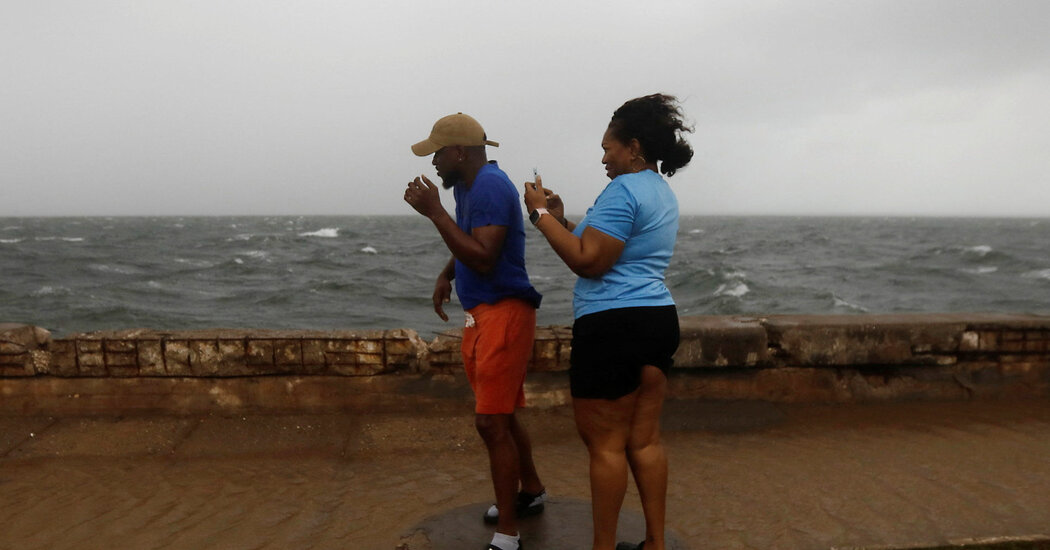Copyright The New York Times

Hurricane Melissa, a Category 5 storm, is churning toward Jamaica. The hurricane could be the strongest storm in the island’s recorded history, with winds of 175 miles per hour, potentially life-threatening flooding and a devastating storm surge. Hurricane Melissa is expected to make landfall tomorrow morning; you can find the latest updates here and track the storm live. Melissa has been moving painstakingly slowly across the Caribbean’s warm waters, and it is expected to deliver rain totals measured not in inches but in feet. Officials in the region have ordered more than a million people to evacuate and have closed many airports and schools. More on the storm: Melissa has already caused heavy wind and rain across the Caribbean. In Haiti, the U.N. food agency fears it will not have enough to feed people. The storm is almost certain to make a second landfall in Cuba tomorrow night or Wednesday morning. The U.S. evacuated about 1,000 people from Guantánamo Bay, but 3,000 more remain. Like this year’s other major storms, Melissa seems very likely to miss the U.S. Trump began the trip yesterday by signing a series of trade deals with Malaysia, Thailand and Cambodia. He met with Japan’s emperor today, and tomorrow he is set to meet with the new prime minister. On the agenda: a discussion on how Japan can increase its own military spending and invest more in the U.S., both of which Trump has demanded. And on Thursday, Trump is set to meet with his Chinese counterpart, Xi Jinping, to discuss a trade deal. Details of the potential agreement suggest that it would return the U.S.-China relationship to where it was before this year’s trade war — and would solve a crisis of Trump’s own making. In other Trump administration news: Mexico’s president said the U.S. would give her country more time to make policy changes to avoid an increase in tariffs. Trump said he “would love” to serve an unconstitutional third term. We asked voters to weigh in on Trump’s planned White House ballroom. They offered outrage and optimism, a reflection of the deep political divide. The partisan redistricting battle keeps growing Mike Braun, the Republican governor of Indiana, called a special legislative session today to redraw his state’s congressional map to benefit his party. The push makes Indiana the latest red state to consider upending the typical redistricting schedule at Trump’s behest. It’s unclear if Braun’s effort will have enough support to pass new maps. But other Republican-led states, like Texas, Missouri and North Carolina, have already done so, netting the party as many as seven House seats in next year’s midterms. Democrats have responded with their own redistricting efforts. In Virginia, lawmakers met today to begin the process of redrawing the state’s maps to benefit Democrats. In New York, where a bipartisan commission is in charge of the maps, Democrats are hoping that lawsuits — like one filed today — can flip a few seats. And a measure on the ballot in California next week could give Democrats a more favorable map in the state. Politics is changing the way history is taught Several major curriculum publishers have recently withdrawn history and social studies materials. California has retreated from teaching ethnic studies. And a group that provides free, nonpartisan lesson plans has found that teachers are shying away from topics like constitutional limits on executive power. According to a recent poll of educators, some of that is a result of political pressure. Supporters of the changing curriculum say it’s a long-overdue corrective to what they see as a leftward tilt in the education establishment. Critics, however, see the changes as an alarming crackdown on free speech led by the Trump administration. More top news Elections: The party of Argentina’s libertarian president, Javier Milei, won a resounding legislative victory. Trump had threatened to withhold his $20 billion bailout of Argentina unless Milei’s party won. Africa: The world’s oldest president, Paul Biya of Cameroon, won re-election. He will be nearly 100 years old when his next term ends. Media: John Dickerson, an anchor of CBS’s nightly news broadcast, is leaving the network, the first major departure since it came under new ownership. Health: Diphtheria, a vaccine-preventable disease that is especially dangerous in children, is surging. One hospital in Somalia has had nearly 1,000 cases this year, compared with 49 last year. Vaccines: The anti-vaccine movement has led some pet owners to oppose lifesaving rabies shots for their cats and dogs. California: A stretch of Los Angeles known as “the Blade” has become one of the country’s most notorious sex-trafficking corridors. A reporter for The Times Magazine embedded with vice investigators there. This pseudonymous author quickly gained a mass following Jack Carr was a Navy SEAL before he became a best-selling author, and that’s a big part of his appeal. His thrillers, including his latest, “Cry Havoc,” are full of details and experiences that Carr learned from his time in the military. Since his debut novel in 2018, Carr — who uses a pseudonym to protect his privacy — has sold more than five million copies and generated a large following among fellow veterans. His books have already spawned two TV series. Science sheds light on an ancient practice Some 2,000 years ago, the people of the northeastern Iberian Peninsula — modern-day Catalonia — observed a macabre ritual. They would mount the skulls of the dead on porches, walls and stakes. Were these displays trophies of war or memorials to loved ones? A new paper suggests that both were true. By studying atomic isotopes, researchers learned whether the skulls had belonged to locals or outsiders. Skulls of locals were showcased in a home, while those of outsiders were found near a settlement’s outside wall — suggesting they might have been mounted as a warning.



